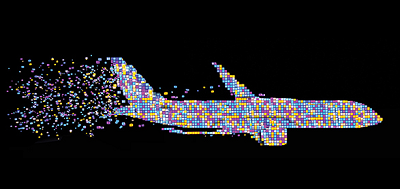ALEGRO

ALEGRO aims at a significant acceleration of load calculation time along with an improvement of result quality in using for the first time deep-learning algorithms and problem specific out-of-the-art technologies that have not yet been established in aircraft design.
There is a common industrial need to make methods, tools and processes, which are currently used in aircraft design, more accurate and faster. With regard to the nationwide implementation of "Industry 4.0", the use of self-learning algorithms (e.g. neural networks) or the processing/evaluation of large amounts of data (big data) is becoming the main focus of the aircraft design. Loads in flight, which are considered in ALEGRO, are, very generally speaking, calculated using a flight-mechanical simulation of the aircraft in the considered flight condition, such as a gust or a maneuver. Same applies to the landing impact and emergency watering. In order to carry out these calculations, usually, a method is required (e.g. solution of the equations of motion) describing the way of calculation and a model depicting the respective engineering use case. Depending on the technical problem, this model is subdivided into partial models, all coupled to each other. The type of the chosen solving method is strongly dependent on the considered problem. A gust model is usually linearized in the frequency domain. Other models (e.g. local proof model for engine / aero / flaps interaction) have to be set up non-linear.
ALEGRO addresses several specific problems in the loads calculations on the one hand such as the way excitations are coupled to the structure in high-frequency range in order to improve the structural dynamic modeling and get a better understanding of observed phenomena, the way aerodynamic models (Doublet Lattice Model) are corrected for transonic flow simulations especially in preliminary design, when no aforehand analysis is available, or, finding simplified solutions to calculate parameters needed for certification (in the case of emergency watering simplified solutions have been found to calculate the total evacuation time of the aircraft with regard to the previous highly time consuming modeling method). On the other hand, ALEGRO addresses aspects for which the process as a whole has to be considered (e.g. improvement of the load assumption quality in the preliminary design) or new technological developments (e.g. big-data analyses, uncertainty management).
The following partners contribute to ALEGRO:
ALEGRO started in January 2019 and will last till March 2022.
This project is funded by LuFo V-3 under the agreement 20A1709D
